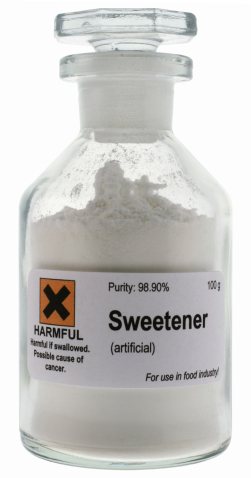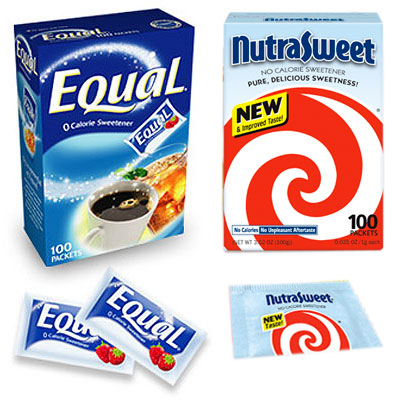Before you reach for that diet soda, read this article.
Well, here is something to think about…
Many of the foods we consume we sincerely believe are healthy for our bodies. Often the label reads “diet,” “sugar-free,” or even “diabetic friendly.” So, in an effort to make the right choice for our health, we choose the one with the least amount of harm associated with it.
Yet, the associations we make with food are often linked to what we hear in advertisements about these sugar-free options giving us no reason for guilt and leaving out the information that they contain a deadly substance. Misleading advertisements regarding sugar-free foods are leading people down a deadly path.
These faux-healthy options that are readily available on the grocery store aisles, in the soda machine, and even on the table in most restaurants may contain this deadly synthetic sweetener: ASPARTAME.
History of Aspartame
 Aspartame was initially being tested as an anti-ulcer medicine in 1965 by a chemist for G.D. Searle Company, but found its way into the food industry as a sweetener in the early 1980s. Researchers who tested aspartame determined that it caused brain tumors, pancreatic tumors, uterine tumors, and mammary tumors in lab rats. These findings caused an appropriate delay in the approval of the use of aspartame in the mid-1970s.
Aspartame was initially being tested as an anti-ulcer medicine in 1965 by a chemist for G.D. Searle Company, but found its way into the food industry as a sweetener in the early 1980s. Researchers who tested aspartame determined that it caused brain tumors, pancreatic tumors, uterine tumors, and mammary tumors in lab rats. These findings caused an appropriate delay in the approval of the use of aspartame in the mid-1970s.
Yet, in spite of aspartame’s detrimental effects to lab animals, politics and profits won out. In 1977, U.S. Attorney Samuel Skinner was chosen by the FDA to prosecute G.D. Searle Company for withholding or misrepresenting important research about the effects of aspartame on the lab rats. After a meeting with Searle’s law firm, Skinner mysteriously quit the FDA and began working for the other side. Eventually, the formal objections to the FDA about not approving aspartame were dismissed and aspartame began seeping into mainstream food.
What is Aspartame & its effects on your health?
Aspartame is a synthetic sweetener composed of phenylalanine, aspartic acid, and methanol. While each chemical poses its own risk to the body, research indicates that this combination of chemicals makes aspartame even deadlier to those who are consuming it in the array of foods it occupies.
Phenylalanine, an amino acid found in the brain, makes up 50% of aspartame. Ingesting aspartame increases levels of phenylalanine in the brain and may cause serotonin levels to decrease and may contribute to depression, mood swings, seizures, and schizophrenia. There is also heightened risk for those who have PKU, which is a disorder in which the person’s brain lacks the enzyme to remove or breakdown phenylalanine, which damages the brain in the aforementioned ways.
Aspartic acid, which makes up 40% of aspartame, is another amino acid which stimulates the nervous system. Its use triggers excessive amounts of calcium to flow into the brain, which leads to free radicals building up, and eventually causing cell death in the brain. Research indicates that aspartic acid causes lesions in the brains of lab rats. There are many common illnesses that are related to excessive amounts of this amino acid in the brain, such as memory loss, Parkinson’s disease, and dementia among an array of others, including death.
Asapartame is also excitatory neurotransmitter. Neurotransmitter excites the brain neurons and increases levels of electrical activity in the brain and the auditory cortex, which increase the level of tinnitus (ringing in the ears).
Finally, aspartame is made up of 10% methanol, also known as wood alcohol. This is a toxic poison that damages many organs of the body. Headaches, dizziness, nausea, vertigo, and gastrointestinal disorders are among the vast symptoms of methanol poisoning. Vision problems, such as retinal damage, are the most common symptoms from methanol poisoning.
What can you do to avoid Aspartame?
 Now, after you realize the damaging effects that this sweetener has on your body, you need to understand how to avoid it. First, it’s important to recognize the brand names of aspartame sweeteners which are NutraSweet and Equal.
Now, after you realize the damaging effects that this sweetener has on your body, you need to understand how to avoid it. First, it’s important to recognize the brand names of aspartame sweeteners which are NutraSweet and Equal.
Then, understand that in the United States, as well as other western countries, aspartame is supposed to be included on the label of products that use it. It may also be identified as containing phenylalanine on the label.
The manufacturers of these substances go to great lengths to convince people that their products are safe and sometimes they hide the dangerous ingredient by using a different name. Therefore, it is important to avoid foods using chemical sweeteners in any form in order to avoid aspartame.
So, when you go to the grocery store to pick up something healthy for yourself, remember to skip those sugar-free diet foods. Avoid consuming diet soft drinks, sugar-free candies, or sugar-free gum. Double check the labels on yogurt, cereal, ice cream, or any other product that makes a claim that it is sugar-free or diabetic friendly.
If you want to cut down on your sugar intake, there are safer options for you!
 Natural sweeteners are much healthier for people than synthetic chemical sweeteners like aspartame. Stevia leaf extract is an herbal sweetener with no calories. It comes from the stevia plant which could even be grown in your garden to use when needed. Stevia is a great choice to sweeten your food and beverages. Other great options to sweeten food are raw honey, organic grade b maple syrup, and even fruit juice concentrates. Many of these foods are high in antioxidants so there may be health benefits in consuming them in moderation. Apple sauce, bananas, and dates are especially useful for sweetening foods that you make in your home, although you may need to use these to supplement sugar rather than eliminating it completely.
Natural sweeteners are much healthier for people than synthetic chemical sweeteners like aspartame. Stevia leaf extract is an herbal sweetener with no calories. It comes from the stevia plant which could even be grown in your garden to use when needed. Stevia is a great choice to sweeten your food and beverages. Other great options to sweeten food are raw honey, organic grade b maple syrup, and even fruit juice concentrates. Many of these foods are high in antioxidants so there may be health benefits in consuming them in moderation. Apple sauce, bananas, and dates are especially useful for sweetening foods that you make in your home, although you may need to use these to supplement sugar rather than eliminating it completely.
Over time, you may find that you actually prefer the natural flavors of food instead of the sweetened version and slowly transition from the need of much sweetener.
Now you know the truth behind aspartame and you know of other options for sweetening your food. You can proceed confidently into a store and walk away from any advertisement that makes incredible claims about a product saying it is sugar-free and will help you lose weight.
Avoiding deadly aspartame may be difficult because it is in so many products, but understanding the risks associated with it will hopefully give you a reason to read labels and stay away at any cost!
If you have been unknowingly consuming aspartame and other sweeteners, it can create serious damage to your digestive system. Go to the next page to learn more on the 3 digestive tips to strengthen your gut.
About the Author:
Emma Deangela is the best selling author of The Alkaline Diet Program and 80/20 Fat Loss. She has helped over tens of thousands of men and women to lose weight and transform their health with sound nutrition advice. If you have issues losing weight, check out her video to learn about her alkaline tricks to lose weight effectively.
Which wonderful friends in your life are not aware of the deadly effects of aspartame?
Please help them by sharing this eye-opening article with each of them using any of the social media and email buttons below.

Leave a Reply